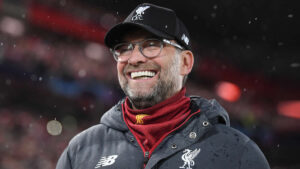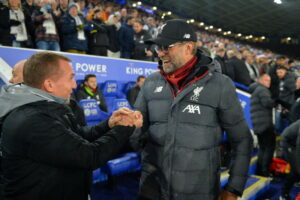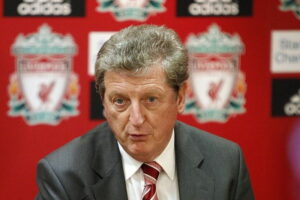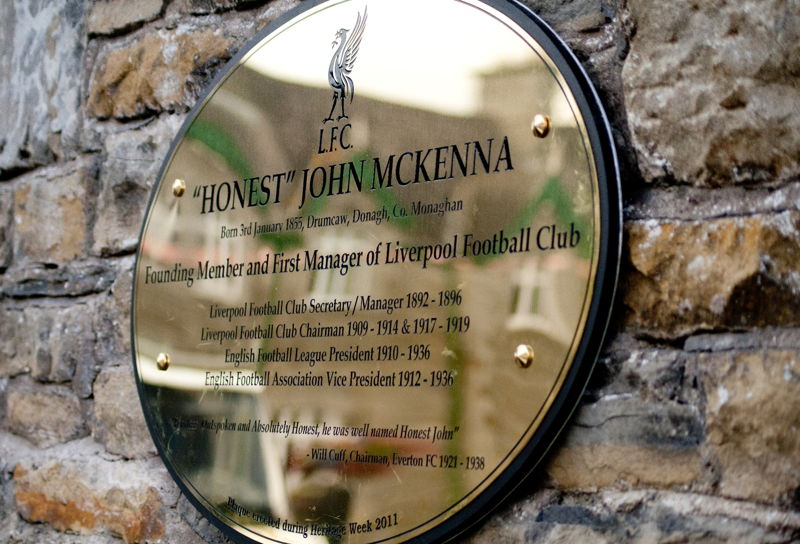
There are several men that are considered to be the founding fathers of Liverpool, with John McKenna’s name very much on the list. Whilst he didn’t help to create the club as we understand it in the modern era in the same way that Bill Shankly did, what he achieved allowed there to be a Liverpool Football Club in the first place.
He was a driving force for the establishment of the new club in the wake of Everton’s decision to depart Anfield for Goodison Park, having also played something of a role at the side that was known as St Domingo Football Club when it was first formed. Indeed, when he died, three players from Liverpool and three from Everton carried his coffin.
A footballing pioneer. John McKenna played a significant role in Liverpool’s early history. 🔴
📽️ 50 Men Who Made #LFC: https://t.co/TTweYnS0eF pic.twitter.com/2oJRDiSEvQ
— Liverpool FC (@LFC) April 30, 2018
Quite what his role was at Liverpool is a matter of debate in some quarters. There are many who believe that McKenna and William Edward Barclay served alongside one another as Liverpool’s first managers. Others, though, feel that Barclay was the manager in the first few years of the club’s existence, whilst McKenna then took over after him.
Exactly where the truth lies perhaps has as much to do with the way that the roles at football clubs worked during the early years of the sport’s existence as anything else, but we do know that McKenna was a hugely influential figure in Liverpool Football Club’s formative years.
McKenna’s Early Years
 Seán Mac Cionnaoith, known by the English name John McKenna, was born in County Monaghan in Ireland on the third of January 1855. We don’t know a heap about his early life, but we do know that he left Ireland for work as a 15-year-old, taking a ship over to Liverpool like so many Irish people had done before him.
Seán Mac Cionnaoith, known by the English name John McKenna, was born in County Monaghan in Ireland on the third of January 1855. We don’t know a heap about his early life, but we do know that he left Ireland for work as a 15-year-old, taking a ship over to Liverpool like so many Irish people had done before him.
When he arrived in the city it would have looked vastly different to the city that we understand today, with the Port of Liverpool Building opening its doors for the first time in 1907, the Liver Building not opening until 1911 and the Cunard Building being built between 1914 and 1916. In fact, the city wasn’t even a city until 1880.
Wealth and poverty stood side by side in the town, with merchants and traders making huge sums of money whilst workers were crammed into small spaces that frequently saw outbreaks of diseases like cholera. There were 600,000 people living in the tenements and houses of Liverpool, whilst open spaces were not all that common.
A little outside of the city, Stanley Park was being opened to provide fresh air and somewhere for people to go and relax. It was unlikely that there was much football played there, considering the fact that Liverpool was a rugby place at the time. McKenna himself formed a regimental rugby club and played professionally in the West Lancashire County Rugby Football Union.
Joining John Houlding
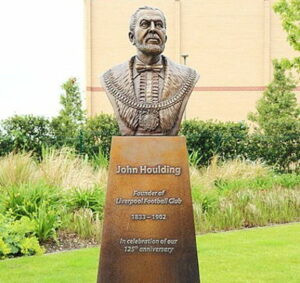
In spite of being a professional rugby player, McKenna struggled to make money through the sport. Instead, he took up a role as a vaccination officer in West Derby and in 1884 met a men named John Houlding. A local brewer, he was also also a Freemason and would go on to be the Conservative mayor of Liverpool. McKenna was also a Freemason, so it is entirely possible that the pair met each other at a Masonic Lodge.
Houlding was the Chairman of Everton Football Club, which had changed its name from St Domingo, and invited McKenna to watch his team play a match at Anfield, which they were forced to move to from Stanley Park by Football Association rules.
In the years that followed, McKenna was invited to join the Everton board. He helped to expand the club, with attendances at matches growing to more than 8,000. The side won the newly formed First Division for the first time in 1891, with McKenna and Houlding working alongside one another well and also forming a bond with William Edward Barclay.
In 1892, Houlding decided to put the rent up for Everton to play at Anfield, which caused a fraction of the board and the Everton members. A revolt was led by a local liberal political and Methodist, George Mahon, who suggested that Everton move to nearby Goodison Park.
Liverpool is Formed
John McKenna and William Edward Barclay were loyal men, choosing to stick with John Houlding even as most of the rest of the Everton board left for pastures new. Houlding now had a football ground but no club to play games on it, so he decided to create a new one. Barclay suggested that the new club be called Liverpool, whilst he and McKenna are believed to have been given the position of joint-Secretaries.
There are some who believe that Barclay became Secretary-Manager, whilst McKenna took on the team affairs and concerned himself with on the pitch matters. He wrote to the Football Association, asking them to admit Liverpool to the Football League.
The founder of this magnificent football club, JK Houlding, in all his finery. With William Barclay from Dublin (he said name the team Liverpool, and John McKenna also from Ireland (as Manager) on they strode to put Liverpool FC on the British footballing map.#liverpoolfc pic.twitter.com/UZy3Nx3uiD
— “YNWA” The Story of Liverpool FC (@LFCHistoryShow) March 10, 2020
The application was turned down and, having not also written to the Second Division at the time, Liverpool were left having to enter the Lancashire League. Eventually they made their way into the Second Division and from there the First Division, winning promotion thanks to a victory over a club called Newton Heath in the test match.
Newton Heath, of course, would go on the become Manchester United. McKenna chose to change the look of Liverpool, getting the club to play in red shirts and black shorts, rather than the blue and white that they had been playing in before. Was he the club’s first manager? It is a matter of some debate.
Liverpool’s First ever Manager came from Ireland and his name to people who knew him was… Honest John McKenna. pic.twitter.com/OT7sPAZZty
— “YNWA” The Story of Liverpool FC (@LFCHistoryShow) September 28, 2016
As you’ll know if you’ve read our page on William Edward Barclay, the role of manager as we understand it in the modern era wasn’t so easily defined during football’s more formative years. There are plenty who feel that McKenna and Barclay shared the role, whilst others believe that it was Barclay on his own who should be considered the club’s first manager.
What we do know is that he used his connections in Glasgow to help build what became known as the ‘team of Macs’, thanks to so many of the players having ‘Mc’ in their surnames. The team included the following:
- Duncan McLean
- James McBride
- Malcolm McVean
- Hugh McQueen
- Matt McQueen
- John McCartney
- Bill McOwen
- Joe McQue
McKenna as Liverpool Chairman
During his association with Liverpool, John McKenna served as the club’s Chairman between 1900 and 1919 and then again between 1917 and 1919. During his time behind the scenes, in roles other than just the Chairman’s seat, McKenna helped to form the club. He was influential in the signing of Tom Watson as manager of the first-team, for example, which led to the club’s first top-tier titles in 1901 and 1906.
Sadly for McKenna, boardroom trouble was never too far away during his time at Anfield. Having become involved in the club in a bigger level because of Everton’s departure, it was also what saw him leave the club.
In 1921, McKenna was keen for Matt McQueen, a former player, and John Keating, one of his fellow Directors, to be re-elected to the board. When the vote happened, however, neither of them had won the vote and McKenna resigned in protest. It saw a 30-year association with Liverpool come to an end, with McKenna instead choosing to focus on his role as President of the Football League; a position he had been elected to in 1917 and would remain in until he died in 1936.
Known as ‘Honest John’, McKenna was a fearless and outspoken governor of football who will forever be remembered as a Liverpool legend.
John McKenna’s Honours List
There will always be some debate as to whether or not John McKenna can actually be considered to have been a Liverpool manager, with many believing that the role was actually taken up by William Edward Barclay. Without being able to offer any sort of definite proof, however, we will give both men credit for the following achievements:
- Football League Second Division: 1893-1894, 1895-1896
- Lancashire League: 1892-1893

